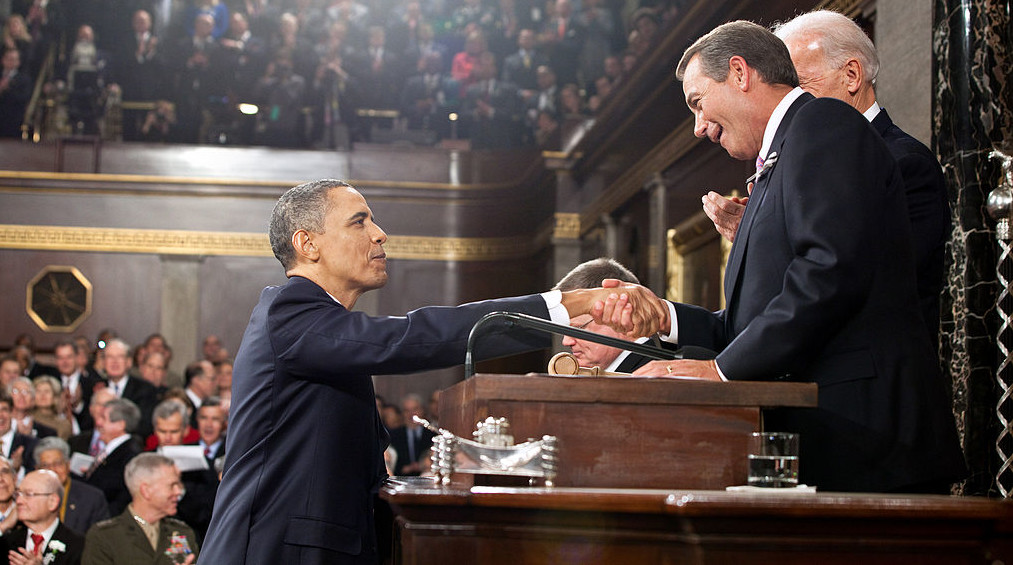There’s a saying that claims that if both sides of a debate are unhappy with you, you must be doing something right. President Obama, in that case, must be onto something with his latest budget proposal: Both Republicans and many members of his own party have disparaged his plan.
The president’s plan calls for some additional revenue, gained by capping how much wealthy people can deduct on their taxes and how much money they can place in tax-protected retirement accounts. The proposal also calls for some cuts to entitlements, by using a different formula to create lower cost-of-living increases to Social Security benefits, and by creating some kind of means testing so that wealthier Medicare recipients pay more.
As Ezra Klein and others have noted, the president’s plan seems to be aimed at creating the impression that he is being reasonable, and any failure to reach an agreement is the fault of intransigent Republicans. It also rebuts the criticism of many “moderate” pundits, like David Brooks, who argue that Obama has shown a lack of take-charge leadership. This plan appears to be along the same lines that Obama offered to House Speaker John Boehner in order to avert the fiscal cliff – a plan that Boehner rejected after initially expressing interest.
The downside is that by starting with a compromise proposal, Obama risks having the final deal end up even more rightward than he initially proposed. Republicans have shown little fear in saying no, even if their obstinacy threatens something important like the US credit rating. This puts them in a prime position to keep rejecting the president’s proposals, until he adds more and more budget cuts or asks for less and less revenue.
If the Republican Party were a rational negotiator, they would use their reputation to secure the friendliest deal possible, before then agreeing to that compromise. And they could probably force Obama to offer a fairly conservative proposal that Democrats, especially liberals, would hate. But Republican history also shows that a vocal and powerful segment of the party believes in lines in the sand rather than compromise. A budget proposal, no matter how good for their side, would probably be rejected if it included new revenue.
Obama tried this reasonable approach earlier in his term, before embracing a more partisan tone around the campaign. Before the campaign, he appeared to hope that his conciliatory nature would create public backlash against Republicans, forcing a compromise. This approach failed, mostly because gerrymandered districts in conservative states have elected enough Republicans whose mission is to oppose Obama whenever possible, and these districts reward adherence to conservative dogma.
The president’s new approach, exemplified up his recent dinners with congressional Republicans, seems to be based on the idea of creating a critical mass of Republicans in Congress who look favorably upon a meaningful compromise. This would create the conditions that let Boehner allow a vote on a compromise budget, even if a majority of his members don’t support it.
This scenario might not be as implausible as it sounds. The Republican Party has an informal rule, called the “Hastert Rule” after a former speaker of the house, which states that a bill cannot be brought up for a vote unless it’s supported by a majority of the party. But Speaker Boehner has violated this rule three times this year, with the fiscal cliff compromise, the Hurricane Sandy relief bill, and the Violence Against Women Act.
If President Obama is able to sway enough Republicans, and John Boehner decides that it’s worth cementing his legacy by risking his job, then a compromise budget along the lines the president has proposed is possible. Boehner’s immediate rejection of the president’s budget means this process is not off to a good start. And Republicans members of Congress have learned that repeatedly saying no carries little consequences. The best hope is that national Republican leaders, sick of losing presidential elections, will prode their party into a more compromising stance. If Mitt Romney were interested in returning to the public stage and didn’t mind hurting any future presidential ambitions, he could redeem his reputation as an effective and reasonable public manager by helping to broker a deal. But given the facts on the ground, these scenarios are still longshots.
